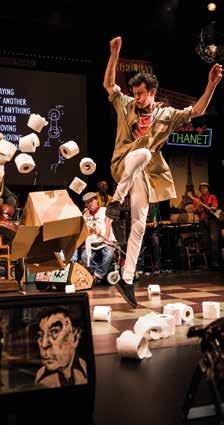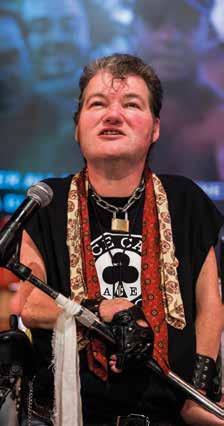
8 minute read
Theatre
Review of London’s Theatre Productions by Lydia Parker
It was a sad occasion when theatres closed their doors due to the pandemic, but a sound decision. As a theatre maker myself, I’ve found it a trying time, wondering when and if I’d ever have a career again in live performance. We can but hope that all artists are continuing to thrive, create and produce work ready for the safe re-opening of venues or for online viewing.
Luckily there is much to watch online, catching up with filmed live streams of performances we’d meant to watch but missed; I was thrilled to see Complicité’s The Encounter on the Barbican website and The Barbershop Chronicles by Inua Ellams on the National Theatre at Home. They broadcast a new play each week for free, asking those who can to donate. As I write this they are showing The Donmar Warehouse production of Coriolanus with Tom Hiddleston. www. nationaltheatre.org.uk/nt-at-home. The RSC has been broadcasting free Shakespeare on BBC Radio 4 www.rsc.org.uk.
The Globe Theatre has its own pay per view channel online: for £5.99 you can choose one of seventy three productions of primarily Shakespeare, both homegrown and from other countries such as Japan, Georgia, and Lithuania on Globe Player TV www.globeplayer.tv.
For those expats missing American performing arts, Lincoln Center at Home is offering a wide variety of productions ranging from concerts to opera to musicals www.lincolncenter.org/lincoln-center-at-home. Wasted I decided for this issue to have a look at a couple of productions off the beaten path which are streaming for free throughout the summer. The first is Wasted, a musical about the Brontes with music by Christopher Ash and book and lyrics by Carl Miller, presented by Southwark Playhouse.
Although the driving beat of the music is at first jarring as an anachronism, you soon see the brilliance of pairing contemporary music with the passionate desperation of this brilliant family. The story is told with no set, the performers communicating mostly through microphones straight out to the audience. With one slamming song after another , we learn about their early life in Haworth, a poor town in Yorkshire where they all felt out of place. Branwell, the only son, is the least talented but believes himself a bit of genius, although he can’t settle on whether he is an artist, musician or poet, and can’t seem to finish anything he starts. He hopes his sisters will marry well as it is obvious he cannot support them. Charlotte gets frequent proposals from Mr Smith, the local curate, but refuses him each time as she wants to be free to write. Anne plaintively sings the folk like song “No One to Marry”; she has dreams of happiness but despairs of finding anyone suitable in their isolated little town. Emily, meanwhile, declares her dog Keeper is her soulmate, as she sings “Only pup’s prepared to put up with my monologue in a bog”. Her musical homage to her dog as she runs off to the moors is probably intentionally reminiscent of Kate Bush.
The Brontes are unlucky in love. Branwell has an affair with Lydia Robinson, the mother of one his pupils. Charlotte falls in love with the husband of her employer in Brussels at a boarding school. She is heartbroken but is the driving force in getting the sisters’ poems published, which don’t sell, and eventually their novels, Jane Eyre, Wuthering Heights and Agnes Grey, which become best sellers. Unfortunately tragedy follows triumph as Branwell becomes addicted to laudanum and all the siblings, except Charlotte, succumb to illness.
The music ranges in style from rock to folk to rap and the numbers are sung beautifully by the strong cast who have a huge vocal range. One of the standouts is Ordinary Woman, where Charlotte describes her main character in Jane Eyre, touching because she is so similar to her creation. Natasha J Barnes portrays her as the solid centre of the family, with an extraordinary voice that can belt out a rock solo or glide through a ballad. She could have a career as a recording artist. Matthew Jacobs Morgan as Branwell shines in all of his songs, particularly “I Paint Myself In”, sung towards the end of the play and his life, recognising that he has never amounted to anything. He gives a real pathos to this character, a man who felt he should be the best at everything as he was the only man in the family, and yet knew he didn’t have his sisters’ talent. Siobhan Atwell is outstanding as Emily, a “goth before my time”. She creates a huge, larger than life wild woman who cannot be contained, has no social skills and is fiercely private about her writing. Molly Lynch is excellent as Anne Brontë, the quiet, religious one who regrets never being held in passion. Her character is given the least attention by the writers, probably as she was not very exciting in real life, but Miss Lynch storms through the songs with as much aplomb as her fellow cast members.
Wasted, like Hamilton, makes historical characters relevant and relatable through new music. Expertly directed by Adam Lenson, it offers the audience a fresh and exciting way to look at familiar stories. Hopefully, this filmed version will inspire producers to transfer this production eventually to the West End and a wider audience. There is some strong language but this could also be a riveting and entertaining history lesson for teenagers and their parents. Wasted will be streamed throughout the summer. www.southwarkplayhouse. co.uk/archive-2018/wasted/
Reasons To Be Cheerful from Graeae Theatre Reasons to be Cheerful, presented by Graeae, was first produced in 2010 and revived in 2017 at Theatre Royal, Stratford. A play within a play, with music by Ian Dury and the Blockheads , it tells a coming of age story set in 1979. Vinnie and his family live in the East End of London, his father Bob is going blind and is stricken with cancer. His mum, Pat, has given up work to care for him. Vinnie has left school to go to work at his mother’s old job at Finefare, with Colin, his best friend who is an anarchist. Both were supposed to be going to see Ian Dury at the Hammersmith Odeon, but Bob, also a huge fan, forgot to buy them tickets. Sleazy Finefare boss Dave, happens to have four, but intends bringing his girlfriend Janine, whom he boasts to Vinnie he is cheating on. Janine overhears and is furious, steals Dave’s tickets and plans to go to the concert with Vinnie, Bob and Colin. Plans go awry when they have car trouble, but an attraction between Vinnie and the lovely Janine develops. It is a slight plot but enough to carry this energetic, exuberant, intentionally messy musical.
Graeae is a theatre company for D/ deaf and disabled performers but also includes able bodied actors. Disabilities are mentioned but not highlighted: Colin, played by the hilarious Stephen Collins, is deaf ; he signs and speaks his lines. There is also a Sign language interpreter, Jude Mahon, who signs the entire performance and dances; she is as much an onstage presence as the other characters. Max Runham, who plays the cartoonish sleaze bag Dave, removes his prosthetic arm when he changes into other characters or plays guitar. Wayne “Pickles” Norman is the audio interpreter. It all blends together well and indeed should be inspiration to other theatre companies to do the same.
Ian Dury was himself disabled by polio when he was seven, which makes this tribute to his music a perfect fit. He studied art at the Royal College of Art and taught art, but formed the Blockheads in the mid seventies. The music is uniquely British, post punk rock with jazz, reggae and shades of music hall. The lyrics are rude, crude, clever and poetic. One can hear how bands Squeeze and Madness were influenced by Ian Dury. The Blockheads, however, were that much more edgy and sometimes very angry. The furious anthem “Spasticus Autisticus” was Dury’s response to the condescension he felt from others as a disabled person and was banned by the BBC. The cast performed this song at the opening of the last Para Olympics. His most famous songs “Sex and Drugs and Rock and Roll”, “Hit Me With Your Rhythm Stick” and the title song “Reasons To Be Cheerful (Part 3)” are performed by superb vocalist John Kelly, who has a roaring, growling voice, not imitating Dury but more in his style.
Stephen Lloyd as Vinnie and Beth HintonLever as Janine are charming and funny, nicely juxtaposed by Stephen Collins’ abrasive Colin. The story of Bob’s illness could slip into sentimentality, but aside from the fact that the music won’t let it, Karen Spicer as Pat and Gerard McDermott as Bob, show traditional British resilience and humour to keep the mood buoyant.
There is also an excellent band onstage, including Reasons to Be Cheerful’s writer Paul Sirett on guitar. This is a hugely enjoyable production but definitely not one for the children, as there are far too many sexual references both in the songs and in the play. It is not to be missed, however, and will be streamed until 3 August from Graeae’s website. Again, please donate to the theatre if you are able. www.graeae.org/ reasons-to-be-cheerful-available-free-online.

Graeae’s Reasons to be Cheerful 2017. Photo Patrick Baldwin

Graeae’s Reasons to be Cheerful 2017. Photo Patrick Baldwin










